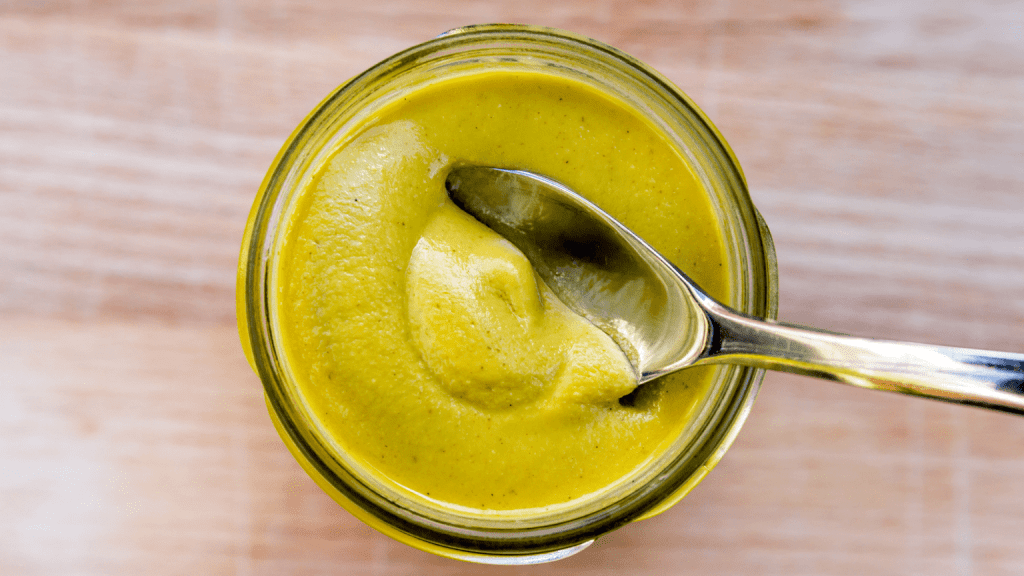We usually think of mustard as a tasty condiment, perfect for adding flavor to burgers, sandwiches, and hot dogs. But did you know that eating a spoonful of mustard after a meal can actually do wonders for your health? This often-overlooked pantry staple is loaded with nutrients and compounds that offer impressive health benefits. Let’s take a closer look at the surprising advantages of mustard and why you might want to consider adding a spoonful to your post-meal routine.

The Science Behind Mustard and Digestion
Mustard has been used for centuries for its medicinal properties, especially when it comes to digestion. One of the primary active components in mustard seeds is myrosinase, an enzyme that helps break down food in the stomach and promotes efficient digestion. Mustard also contains glucosinolates, compounds that not only add to its spicy flavor but also stimulate the secretion of digestive juices, which can improve gut health and nutrient absorption.
When you consume a spoonful of mustard after a meal, you’re giving your digestive system a natural boost. This small addition can reduce bloating, indigestion, and help food move smoothly through your digestive tract. If you’ve been struggling with digestive issues, mustard might just be the secret ingredient you need.
Nutritional Profile of Mustard: More Than Just a Condiment
Mustard is more nutrient-rich than you might think. It’s a fantastic source of vitamins and minerals, including vitamins A, C, and K, and minerals such as iron, magnesium, and phosphorus. It also provides a healthy dose of dietary fiber, omega-3, and omega-6 fatty acids. This unique combination of nutrients makes mustard a beneficial addition to your diet for overall health, not just digestion.
One of the standout features of mustard is its rich concentration of antioxidants, which combat free radicals in the body and protect cells from damage. By simply incorporating a spoonful of mustard into your daily diet, you can harness the power of these antioxidants for better health.
How Mustard Aids in Digestion and Prevents Bloating
So, why mustard after a meal? Mustard promotes digestion in multiple ways. The myrosinase enzyme in mustard activates other enzymes in the stomach that help break down food more effectively. This process reduces the likelihood of common digestive issues, such as bloating, gas, and constipation. Plus, mustard’s high fiber content ensures that everything keeps moving along smoothly in the digestive tract.
The spicy kick of mustard also stimulates saliva production, which is essential for breaking down food even before it reaches your stomach. Eating mustard after a meal might feel a bit unusual at first, but it’s a natural way to support digestion and prevent those post-meal discomforts.
Mustard’s Metabolism-Boosting Power
Another surprising benefit of mustard is its potential to boost metabolism. Mustard seeds contain compounds like capsaicin and allyl isothiocyanates, which have thermogenic properties. This means they can increase your body’s heat production, which may lead to a temporary boost in metabolism. A faster metabolism helps burn calories more effectively, which can be a helpful bonus if you’re looking to manage your weight.

Incorporating mustard into your post-meal routine is an easy and natural way to give your metabolism a quick pick-me-up. And the best part? Unlike some metabolism-boosting supplements, mustard is completely natural and comes with a host of other health benefits as well.
Anti-Inflammatory Properties of Mustard
Mustard is also packed with anti-inflammatory compounds, thanks to its high levels of selenium and magnesium. These minerals help reduce inflammation throughout the body, making mustard a useful addition to the diet for anyone dealing with chronic inflammatory conditions like arthritis or muscle soreness.
The anti-inflammatory effects of mustard can also help protect your digestive system. Inflammation in the gut can lead to discomfort and even contribute to digestive disorders. By including mustard in your diet, you’re giving your body a tool to combat inflammation naturally, potentially leading to fewer digestive complaints and better overall health.
Supporting Heart Health with Mustard
Heart health is another area where mustard shines. Mustard seeds are rich in omega-3 and omega-6 fatty acids, both of which are known to support cardiovascular health. These fatty acids help lower LDL (bad) cholesterol levels and reduce plaque buildup in the arteries, reducing the risk of heart disease.
In addition, mustard’s antioxidants protect the heart from oxidative stress, which can contribute to heart disease over time. By adding mustard to your diet, you’re taking a small but meaningful step toward a healthier heart.
Creative Ways to Incorporate Mustard into Your Diet
If you’re wondering how to incorporate mustard into your meals, you’re in luck! There are so many delicious ways to enjoy mustard beyond just a spoonful after dinner. Here are a few ideas:
- Salad Dressing: Mix mustard with olive oil, vinegar, and a touch of honey for a zesty salad dressing.
- Marinades: Add mustard to marinades for chicken, beef, or tofu. It adds flavor and helps tenderize the meat.
- Roasted Vegetables: Toss vegetables with mustard before roasting for a tangy twist.
- Glaze for Meats: Brush mustard mixed with a bit of brown sugar over meats like ham or pork for a flavorful glaze.

Experiment with mustard in different dishes, and you’ll not only discover new flavors but also make the most of its health benefits.
Precautions and Considerations When Eating Mustard
While mustard is generally safe for most people, it’s important to start with small amounts and see how your body reacts. Some individuals may experience mild allergic reactions to mustard, such as skin irritation or digestive upset. Additionally, eating too much mustard could lead to gastrointestinal discomfort due to its strong, pungent compounds.
If you have any underlying health conditions or take medication, consult with your doctor before making mustard a regular part of your diet. And as with any new addition to your diet, moderation is key.
Conclusion: Unlock the Hidden Benefits of Mustard
It’s easy to overlook mustard as just another condiment, but this humble yellow paste packs a powerful punch of health benefits. From aiding digestion and boosting metabolism to reducing inflammation and supporting heart health, mustard is a versatile and nutritious addition to any diet. So next time you finish a meal, consider grabbing a spoonful of mustard—it might just become your new secret weapon for better health.


